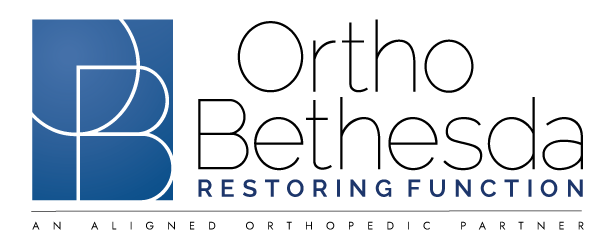
Shoulder instability is a frustrating and often painful condition in which the shoulder joint slips out of its ball and socket frequently. Usually, the top of the humerus fits neatly into the cavity of the shoulder blade. When you develop a loose shoulder, however, it pops off. This issue can reflect injury to structures in the shoulder, including the rotator cuff and joint capsule. Shoulder dislocation can occur too, which can limit the range of motion for your shoulder and lead to difficulty using your arm.
High-Quality Shoulder Instability Surgery
Are you ready to address your shoulder problem after weeks, months or even years of distress? We offer high-quality shoulder instability surgery in Northern Virginia and Maryland. While we treat shoulder injuries and other issues with non-surgical options initially, surgery is sometimes the right choice to provide a stable and long-lasting solution to shoulder instability.
Our shoulder specialists hold office hours at our Bethesda, MD location, and we’ve built an outstanding reputation with our exceptional surgeons and top-notch staff. We treat all of our patients like part of our family, because that’s what they are. We care about them and sympathize with their frustration over their condition. We also take referrals from primary care physicians.
Symptoms of Shoulder Instability
If you’re not sure whether you have shoulder instability, here are a few signs of the condition:
- Your shoulder repeatedly gives or pops out of the socket.
- Your shoulder feels weak and as though it’s not in the right place.
- You feel pain in the shoulder.
What Is Arthroscopy for Shoulder Pain Relief?
Arthroscopy is a minimally invasive procedure we perform to determine the cause of joint problems. Surgeons use a pencil-sized instrument called an arthroscope, which is a diagnostic tool that can also be used as a surgical treatment option.
Using the light camera system of the arthroscope, your surgeon inserts this tool into your shoulder joint and can view the site projected onto a monitor. Arthroscopy allows your doctor to both diagnose and treat a variety of shoulder conditions and injuries involving the bones, cartilage, muscles, ligaments, and tendons surrounding the joint.
Conditions and Symptoms Treated By Shoulder Arthroscopy
Your shoulder is a ball and socket joint formed by the head of the humerus, or upper arm bone and the socket of the scapula, or shoulder blade. Where these two bones articulate creates friction. However, cartilage covers the surfaces of the bones to ensure smooth movement. Ligaments and tendons add extra strength and stability to your shoulder joint.
A variety of injuries and diseases can impact the bones and tissue of the shoulder joint, causing instability, pain, inflammation, and mobility issues. When conservative treatment fails to provide relief, we may recommend shoulder arthroscopy to treat a variety of shoulder conditions and symptoms, such as:
- Arthritis of the shoulder joint
- Arthritis of the collar bone
- Shoulder impingement
- Rotator cuff tear
- Stiffness
- Frozen shoulder
- Instability of the shoulder joint
- Biceps rupture
- Damage to cartilage or ligaments
- Bone spurs
Your Shoulder Arthroscopy Procedure
If you and your OrthoBethesda surgeon choose shoulder arthroscopy to treat your joint issues, the doctor will ensure you fully understand the procedure ahead of time, so you know what to expect. In general, the process is as follows:
- Shoulder arthroscopy can be performed using general or regional anesthesia.
- Usually, patients are positioned lying down on their side, with the affected arm propped up. However, you may also be placed sitting in a semi-seated position.
- Your shoulder joint is injected with sterile fluid to expand the surgical site giving your surgeon room to work and a clear view of the damaged area.
- The doctor makes a button-sized hole through which the arthroscope is inserted.
- The camera in the arthroscope allows your surgeon to view images on a large monitor.
- Additional small holes are made to insert surgical instruments that will allow your physician to repair the damage to your shoulder joint.
- Once the surgery is complete, all instruments are removed and the small holes are closed using stitches or sterile bandage strips.
Recovery After Shoulder Arthroscopy Surgery
After your shoulder arthroscopy surgery, the small wounds may take a few days to heal. You may also experience pain or discomfort for about a week. However, your doctor will prescribe pain medication to help you manage this.
Recovery time depends on the extent of your underlying shoulder issues which your doctor treated. You may also need to keep your arm in a sling as you recover. Rehabilitation begins shortly after your surgery which involves physical therapy to improve your shoulder’s mobility and strengthen the joint. It’s important to participate in physical therapy, as this will help prevent post-operative stiffness.
As with any surgical procedure, there are potential complications, such as:
- Stiffness
- Infection
- Bleeding
- Damage to nearby blood vessels or nerves
- Delayed healing after the procedure
Advantages of Shoulder Arthroscopy
Because shoulder arthroscopy is a minimally invasive procedure, there are many benefits to patients, especially when compared to open shoulder surgery, which involves a large surgical incision. Advantages you can expect include:
- Fewer surgical complications
- Shorter hospitalization
- Faster recovery
- Less pain
Why Choose OrthoBethesda for Shoulder Stabilization Surgery?
We’ve performed minimally invasive arthroscopic shoulder instability surgery on many patients. Our vast experience gives us extensive knowledge about the condition and an understanding of your circumstances. We know how frustrating and uncomfortable it can feel when you repeatedly suffer shoulder dislocations, and we want to help you heal.
Our physicians explain every procedure we perform to our patients. We’ll use plain language so that you can understand what’s happening and how our procedure will help address your condition without needing to navigate complicated medical jargon. We’ll also welcome questions to ensure you grasp every part of the surgery.
Further Reading
The Ultimate Guide For Shoulder Recovery Surgery
When Not To Have Rotator Cuff Surgery
Schedule an Appointment
 ">
">
Get In Touch
Contact Us for More Information on Minimally Invasive Stabilization Surgery
We provide orthopedic treatment at our offices in Bethesda, MD, and Arlington, VA. We’ll use the latest technology to make your recovery from shoulder stabilization surgery as comfortable as possible. You deserve to live a life free from shoulder pain, so contact us today to set up your first appointment by calling (301) 530-1010.
